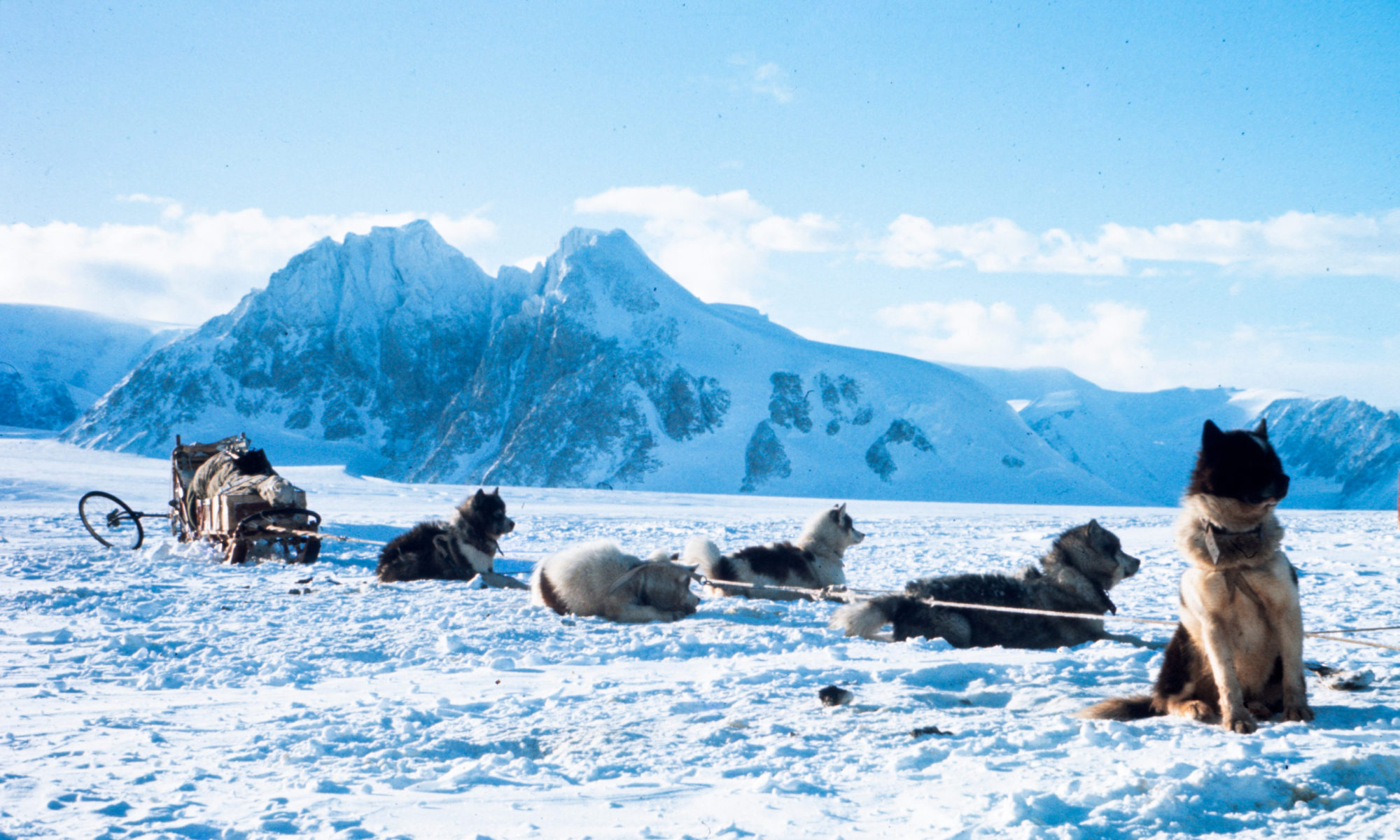“Arrivals and Departures” (continued)
We fell into our bunks and drugged by fatigue were soon asleep – but not for long as suddenly we were wakened by an eerie sound. We first thought it was an air-raid siren (memories of the war still only 3 years ago) but then we were reassured by the experienced hands that this was over 80 huskies wailing together in rising and falling crescendos which was, we were told, a sign of how happy they were.
The next day when we had time to take stock we found that there were 5 ready-trained teams, 9 dogs each and I was given 9 who had never run together before – 3 of them bitches and two virtual novices – my team weas dubbed “The Odds and Sods”.
Joe was the (reluctant) leader, a fairly neutral character.
Mary and Nano – Mary a shy white virgin who maintained both adjectives and Nano (it means white) one of the old originals from Labrador and a most competent back-seat driver which explained a lot of Joe’s nervousness.
Jackie and Imp – brothers – strong – good workers.
Simon and Winnie – Simon was a beautiful brindle, good puller but as simple as his name implied, while Winnie was an unremarkable black and white bitch.
Lastly, Mukluk and Caesar. When Caesar stopped he always had a tight trace. When I talked to the team at the end of the day (and you could not leave any out) I kept him to the end for his trick was to jump in the air and I had to catch his 120lb in my arms while he licked my face.
Mukluk was so named because, having been born in a blizzard with little chance of survival she was put in a mukluk boot and hung hear the stove in the hut. Like Caesar she was black with a white belly but unlike Caesar who knew he was employed to pull, she clearly thought she was there to add glamour. It was almost impossible to be hard with her and she alone of all our 80 huskies on base was the one I knew could be trusted to lick the blood off my hands when cutting up seals in the summer. I was helped in this task by Dave Jones, the air mechanic (we didn’t actually have an aircraft, but that is another story).
We soon got them into a splendid team with me as the King Dog. I had spent ages sewing up other peoples’ dogs – even stitching back ears – and once a nose! There was fighting, but not excessive. None of us was ever bitten. Just once, when I was stitching a painful wound on a dog’s face he turned suddenly and as his teeth were closing on my bare arm he stopped, looked up at me rather shamefacedly and did not move again until I had finished. We had learnt from our predecessors what the experienced Ted Bingham had taught them – you had to be in charge. You knew they were happy when you saw the 9 plume-like tails waving in front of you.
When you camped in the evening, feeding the dogs was first priority and they knew the Pemmican box when you opened it – or even touched it. Satiated with Pemmican, or seal, they would lie down, nose and paws together and sealed from the wind by their large tails they were soon buried and out of the wind if a blizzard was blowing.
Among all the dogs there were four that I particularly remember and they all had distinctive characters.
Lizzie was wildly promiscuous and when in season offered her favours to all.
Crow was generous – when he slipped his trace at night he was found giving a lump of seal meat to all the other dogs present.
Darkie, Ted Bingham’s original lead dog always knew where base was, proven by compass, even when it was 100 miles away across the frozen sea.
Being working dogs they had to be culled from time to time. This was the case in 1950 when no ship had been able to relieve the Stonington for 2 years so the decision was made to abandon it completely. About half the dogs were transferred or taken back to England for display purposes in the Dome of Discovery at the Festival of Britain.
Snipe was one our oldest and was the progenitor of so many younger dogs. In his retirement he was always tethered near the hut and received extra titbits of food and became an institution – a Grand Old Man – but when the time came for our departure, he had to go too. Although we felt it was the ultimate betrayal we traded on their love of food. – a fresh piece of meat lying in the snow in exchange for a .45 bullet through the back of the head. It fell to me to dispatch the old boy. He looked down, picked up the meat and then a strange thing happened. He dropped it, lifted his head and waited. I am sure he was saying “well, I have been reprieved so often I can take what is really necessary, I won’t make it difficult for you”.
David Dalgliesh, Medical Officer – Stonington 1948 and 1949
